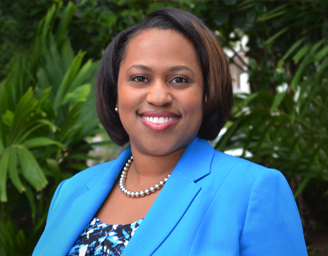Five questions with Dr. Darienne Driver: A glimpse into her leadership style and the future of United Way for Southeastern Michigan
Published on July 11, 2018

Dr. Darienne Driver will undoubtedly bring new perspectives as a former superintendent and educator, and as the first woman and woman of color to lead the organization as its president and CEO.
What attracted you to this role, leading a nonprofit agency?
As an educator for more than 20 years, I know firsthand how students can be directly impacted by inadequate support services. While working in Milwaukee I experienced United Way’s significant impact because they were part of nearly every program implemented for students. I saw United Way’s value in bringing anchor institutions like corporations, schools, churches and nonprofits together around a common cause. I look forward to leading the work at United Way for Southeastern Michigan and making positive and lasting change for individuals and families throughout the communities we serve.
What are some of the goals you’ve set for yourself as the organization’s new president and CEO?
It’s very important to me that the individuals we serve have input in the change transpiring in their community. Not everyone has money to give, but I believe that everyone can give time no matter their station in life. As the former chair of United Way of Greater Milwaukee and Waukesha County’s volunteer engagement committee, I feel strongly about the power of volunteering and how it can change lives.
I’d like to see our organization have more of a presence in the community with satellite centers throughout the tri-counties in conjunction with our partners. They would serve as one-stop-shops offering volunteer opportunities as well as a variety of services addressing basic needs around clothing, food, housing, and skills development and education. The centers would also help build bridges, enhance the communities’ understanding of our work and deepen relationships with our partner agencies in Macomb, Oakland and Wayne counties.
I also see opportunities in the ways we communicate the work of United Way for Southeastern Michigan. We tend to primarily speak to donors as well as members of our affinity groups, which offer tremendous opportunities for enhancement though diversity. However, we could broaden efforts to engage recipients of our services by hosting town halls in the neighborhoods and inviting the voices of those we serve to the table to help inform our decision making.
You’ve led a life of service having taught as an educator, superintendent and now as leader of a nonprofit. How will your life of service influence your role as president and CEO?
I was taught about the importance of giving back in my home as a child. Both of my parents led busy lives as managers in health care, yet they were very active in the church as were my grandparents. Today, my parents are retired but they still volunteer. They taught me that for every gift given you must give something in return. The core values and lessons that my parents taught me remain part of my personal constitution and guide my professional leadership style.
Throughout my educational career in Detroit, and while working in Clayton County in Atlanta, Philadelphia and Milwaukee, I realized that my educational experiences were very different from those of my students. That is why I am on a mission to make sure that every child with whom I come in contact has access to every opportunity, and education is the key. It is the great equalizer. I feel blessed to be where I am today and to have had support every step of the way. I benefited from a strong public education, attended some of the best colleges and have a network of family and friends who are my foundation and village. Every person deserves this.
How do you plan to marry your education background with impact work?
I have seen what happens when organizations are focused solely on education or health care or financial attainment. Collective impact becomes less attainable. Conversely, when public and private partners align with backbone institutions for a common goal, collective impact is possible. It creates positive outcomes for children and their families and helps build healthy communities.
Some of my greatest accomplishments as a superintendent occurred when multiple organizations and institutions worked together to address historical inequities. We were able to improve student’s literacy rates and increase their participation in AP programs, and the number of students attaining driver’s licenses. For every challenge I experienced as superintendent I sought interested partners who had the resources and acumen to make change. That is a recipe for community success and I will bring that knowledge and experience to this role.
What is some of the best advice you have ever received?
I have benefited from many people from various walks of life who instilled knowledge, wisdom and criticism to help me grow. My mentor often reminds me that leadership is a privilege, and true leadership occurs only when others follow. My career opportunities have taken me to different states and I often think of a colleague who once said, “Remember, everyplace you go is someone’s home. You must respect their home and take care of it while you’re there.”
As president and CEO for United Way for Southeastern Michigan, it is my goal to ensure that the homes of those we serve are desirable, stable and livable, and that every decision I make will be made thoughtfully as it will have lasting impact on someone’s life.